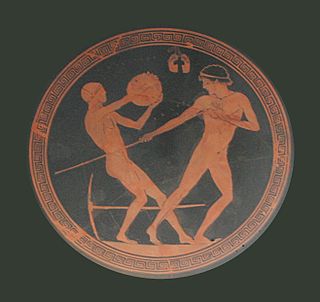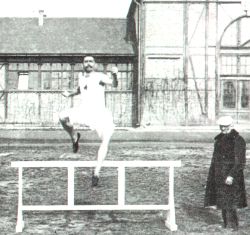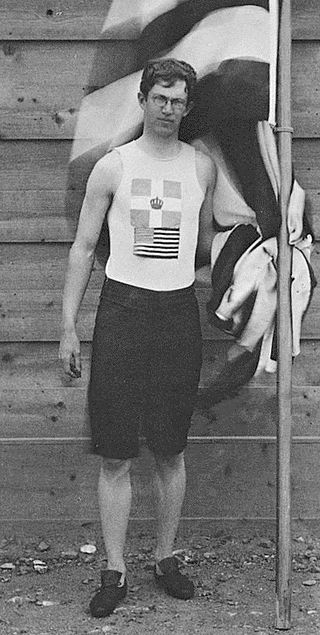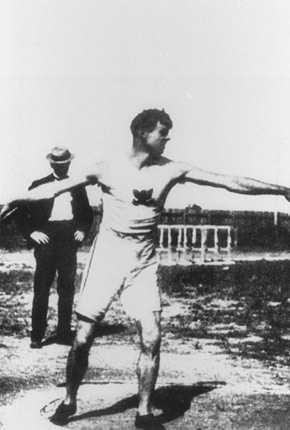
The Summer Olympic Games, also known as the Games of the Olympiad, and often referred to as the Summer Olympics, is a major international multi-sport event normally held once every four years. The inaugural Games took place in 1896 in Athens, Greece, and the most recent Games were held in 2021 in Tokyo, Japan. The International Olympic Committee (IOC) is responsible for organising the Games and for overseeing the host city's preparations. The tradition of awarding medals began in 1904; in each Olympic event, gold medals are awarded for first place, silver medals for second place, and bronze medals for third place. The Winter Olympic Games were created out of the success of the Summer Olympic Games, which are regarded as the largest and most prestigious multi-sport international event in the world.

The 1896 Summer Olympics, officially known as the Games of the I Olympiad and commonly known as Athens 1896, was the first international Olympic Games held in modern history. Organised by the International Olympic Committee (IOC), which had been created by French aristocrat Pierre de Coubertin, it was held in Athens, Greece, from 6 to 15 April 1896.

At the 1896 Summer Olympics, the first modern Olympiad, twelve athletics events were contested. A total of 25 medals were awarded. The medals were later denoted as 37 modern medals. All of the events except the marathon were held in the Panathinaiko Stadium, which was also the finish for the marathon. Events were held on 6 April, 7 April, 9 April, and 10 April 1896. Altogether, 63 athletes, all men, from nine nations competed. This made athletics the most international of the nine sports at the 1896 Games.

Robert S. Garrett was an American athlete, as well as investment banker and philanthropist in Baltimore, Maryland and financier of several important archeological excavations. Garrett was the first modern Olympic champion in discus throw as well as shot put.

A tug of war tournament was held on 16 July at Catalan Cross, Boulogne Forest in Paris as part of the 1900 Summer Olympics. The only match of the tournament was between a mixed team from the Racing Club de France, consisting of five French and one Colombian athlete, and a mixed team consisting of three Danish athletes and three Swedish athletes. The mixed Scandinavian team won the match 2–0.

A pentathlon is a contest featuring five events. The name is derived from Greek: combining the words pente (five) and -athlon (competition). The first pentathlon was documented in Ancient Greece and was part of the Ancient Olympic Games. Five events were contested over one day for the Ancient Olympic pentathlon, starting with the long jump, javelin throwing, and discus throwing, followed by the stadion and wrestling. Pentathletes were considered to be among the most skilled athletes, and their training was often part of military service—each of the five events in the pentathlon was thought to be useful in war or battle.

Carl August Berthold Schuhmann was a German athlete who won four Olympic titles in gymnastics and wrestling at the 1896 Summer Olympics in Athens, becoming the most successful athlete at the inaugural Olympics of the modern era. He also competed in weightlifting.

Kristian Henrik Rudolf Sjöberg was a Swedish athlete, gymnast and medical student. He competed as the only Swedish participant at the 1896 Summer Olympics in Athens.

Panagiotis Paraskevopoulos was a Greek athlete. He competed at the 1896 Summer Olympics in Athens, and the 1900 Summer Olympics held in Paris. He was born in Gortynia and died in Corfu.

Sotirios Versis was a Greek athlete and weightlifter. He competed at the 1896 Summer Olympics in Athens and the 1900 Summer Olympics held in Paris.

Three athletes from Denmark competed in five sports at the 1896 Summer Olympics in Athens. Two of the three combined to win a gold medal, two silvers, and three bronzes, while Eugen Schmidt earned no medals. Viggo Jensen contributed one of each color, while Holger Nielsen earned the second silver and two bronzes. Shooting and weightlifting were Denmark's most successful sports. Denmark had 15 entries in 12 events, winning six medals.

Germany competed at the 1896 Summer Olympics in Athens, Greece. The Germans were the third most successful nation in terms of both gold medals and total medals (13). Gymnastics was the sport in which Germany excelled. The German team had 19 athletes. The Germans had 75 entries in 26 events, taking 13 medals.

Greece was the host nation of the 1896 Summer Olympics held in Athens. The number of Greek contestants is commonly cited as 169, but as many as 176 Greeks contested events in all nine sports. The Greeks were by far the most successful nation in terms of total medals with 47, 27 more than the United States of America. Nevertheless, their number of first-place finishes (10) was one fewer than the Americans' 11. The Greeks had 172 entries in 39 events. Only 4 events had no Greek entrants—the 400 metres and the high jump in athletics and the vault and the team horizontal bar in gymnastics.

The men's discus throw was a track & field athletics event at the 1900 Summer Olympics in Paris. It was held on July 14 and July 15, 1900. 17 discus throwers from nine nations competed. The event was won by Rudolf Bauer of Hungary, the nation's first victory in the men's discus throw. František Janda-Suk gave Bohemia its first medal in the event, also in that nation's first appearance. Richard Sheldon's bronze put the United States in the top three for the second consecutive Games.

The men's 110 metres hurdles was the only hurdling event on the Athletics at the 1896 Summer Olympics programme. The preliminary heats were the first track event of the day on 7 April. Eight competitors ran in two heats of four runners each. Only the fastest two runners in each heat advanced to the final. The event was won by Thomas Curtis of the United States.

The men's long jump was one of four jumping events on the Athletics at the 1896 Summer Olympics programme. There were nine contestants in the long jump, held on 7 April. The American jumpers proved themselves dominant in taking the top three spots. The event was won by Ellery Harding Clark. Clark would later win the high jump as well, becoming the only man to win both the high jump and long jump in the Olympics.
The men's shot put was one of two throwing events on the Athletics at the 1896 Summer Olympics programme. Seven athletes took part in the shot put competition on 7 April. The two Greek athletes both won medals, with Gouskos battling closely with Garrett of the United States for the longest distance.

The men's discus throw was one of six throwing events on the Athletics at the 1908 Summer Olympics programme in London. The competition was held on July 16, 1908. 42 throwers from eleven nations competed. NOCs could enter up to 12 athletes. The event was won by Martin Sheridan of the United States, his second consecutive victory in the event. The Americans completed their first sweep in the discus throw, with Merritt Giffin taking silver and Bill Horr bronze.

The men's discus throw was a track and field athletics event held as part of the Athletics at the 1904 Summer Olympics programme. It was the third time the event was held. The competition was held on Saturday, September 3, 1904. Six athletes from two nations competed.

The discus throw is one of four track and field throwing events held at the Summer Olympics. The men's discus throw has been present on the Olympic athletics programme since 1896. The women's event was first contested at the 1928 Olympics, being one of the five athletics events in the inaugural Olympic women's programme.


















